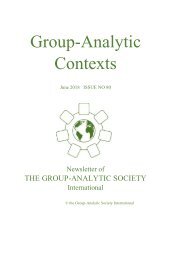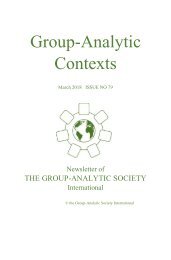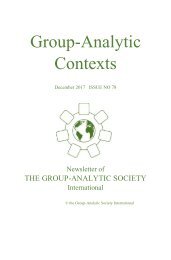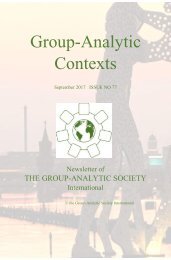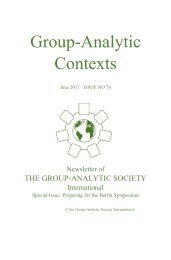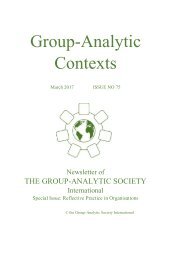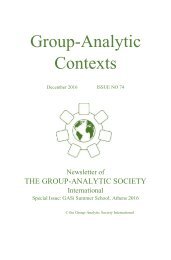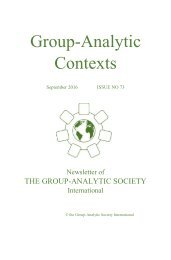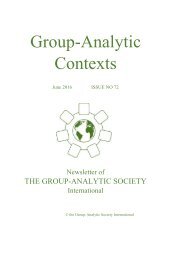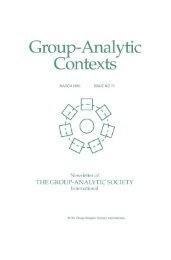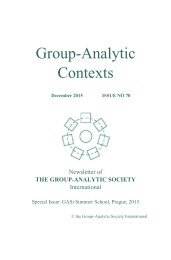Group-Analytic Contexts, Issue 81, September 2018
Newsletter of the Group Analytic Society International
Newsletter of the Group Analytic Society International
Create successful ePaper yourself
Turn your PDF publications into a flip-book with our unique Google optimized e-Paper software.
Newsletter – Autumn <strong>2018</strong> 65<br />
our founding father and some of his descendants aspired to achieve,<br />
or to adhere to. Not attaining this ideal, would therefore result in<br />
displeasure. Hence, the realisation that numbers don’t hold all the<br />
answers and ‘truths’ to what we’re examining, trying to measure or<br />
prove, may even cause some group analysts psychic pain. So, avoiding<br />
such displeasure, offers a motive to adhere to the quantitative<br />
paradigm, or at least, strive to do so. If taken to the extreme, they’re<br />
in danger of forming an unhealthy attachment to this tradition. It relies<br />
on methodological monoism (unity of scientific method), an exact<br />
science, causal scientific explanation, with an emphasis on the<br />
mathematical ideal-type of science and general laws of explanation.<br />
When no other alternatives are considered, the attachment to<br />
the positivist tradition could almost become like fetish (without the<br />
sex), a fixation and substitute object for certainty, which absorbs all<br />
their research interests. However, it means that a part of the ‘research<br />
id’ is repressed, out of allegiance with the ego, and detached from a<br />
reality that offers ‘evidence’ to the contrary: knowledge of other<br />
research traditions. Some may perceive this as a threat to the ego or to<br />
the research image of GA.<br />
Luckily, we can treat this research neurosis. Even though, it<br />
bears the risk of the ‘return of the repressed’ (that other methods exist)<br />
and would result in displeasure. But by bringing repressed knowledge<br />
into consciousness, we can leave behind the fantasy, the fetish and<br />
unhealthy attachment, and form a more mature bond with the positivist<br />
paradigm. I’m not suggesting that we get rid of mathematics, number<br />
crunching, measurements and quantitative methodologies. Quite the<br />
opposite. We should embrace them. Because in practical terms, if we<br />
rejected the quantitative tradition, we would deny ourselves access to<br />
all the exiting methods and implications that arise from this paradigm.<br />
Why should or would we want to do this?<br />
Before answering hastily, let’s consider the purpose of<br />
methods. If we want to gain new knowledge of, or insight into, group<br />
psychotherapy, we need methods. Right? Methods can be valid and/or<br />
useful, both or neither. There isn’t really a simple way to decide<br />
whether validity or usefulness are preferable. It depends on the<br />
question. If the question is whether we should reject quantitative<br />
methods, we may like to ask ourselves whether this would be useful<br />
for GA.<br />
I suggest it’s not. By rejecting this paradigm, we would deny<br />
ourselves access to multiplicity, wouldn’t we? This would be like<br />
eating spinach every day, and who would like to eat these leafy greens<br />
seven days a week? Probably not many of you. So why would we in



